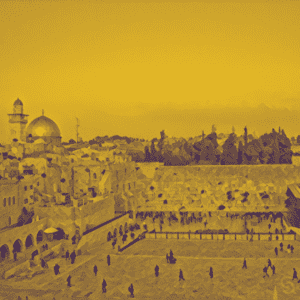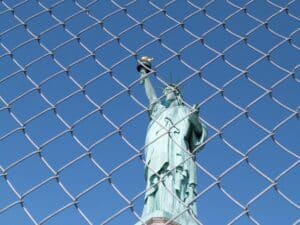 The holy city of Jerusalem exists as one of the most sacred cities in the world to the three major Abrahamic religions–Judaism, Christianity, and Islam. Two peoples (Jews and Palestinians) and three faith traditions not only share the entire city but have also shared interest in individual holy sites as well. Different affiliations to the same sites create tension. Complicating the situation further, each religion has internal factional interests relative to the sites that create intra-religious–in addition to the inter-religious–tensions. So how exactly is it possible for these sites to be apportioned and shared despite the frictions? The answer is something called the status quo.
The holy city of Jerusalem exists as one of the most sacred cities in the world to the three major Abrahamic religions–Judaism, Christianity, and Islam. Two peoples (Jews and Palestinians) and three faith traditions not only share the entire city but have also shared interest in individual holy sites as well. Different affiliations to the same sites create tension. Complicating the situation further, each religion has internal factional interests relative to the sites that create intra-religious–in addition to the inter-religious–tensions. So how exactly is it possible for these sites to be apportioned and shared despite the frictions? The answer is something called the status quo.
The historic status quo, the ruling agreements between government and religious authorities, helps maintain the delicate balance with the goal of ensuring access, safety, and protection of Jewish, Christian, and Muslim holy sites. For example, according to the tradition of the status quo since 1967, the Western Wall is protected as the most sacred place for Jewish religious practice. The al-Ḥaram al-Sharīf (or Temple Mount), according to the status quo, is reserved for Muslim worship and religious traditions, as the Dome of the Rock is viewed as the third most holy place in all of Islam. Christians, by tradition and practice, maintain control over the Church of the Holy Sepulchre, the historical orthodox site of Golgotha and both Christ’s crucifixion and resurrection. However, Jews also have deeply rooted ties to the Temple Mount, as it is traditionally considered the location of where Abraham was called by God to sacrifice Isaac. But according to the status quo and the orders of the Chief Rabbis of Israel, Jews should not worship on the Temple Mount because of fear of unknowingly entering into the Holy of Holies.
What is status quo exactly? Not surprisingly, it depends. The term and concept have multiple possible meanings, but in general, as it relates to Jerusalem, the status quo is the balance of historic commitments, customs, and rights that allow each group enough space to worship according to their traditions. Because some sites are sacred to multiple groups, unilateral changes to this balance by one group to the exclusion of others is likely to violate someone’s religious freedom and rights to historic worship practices. The idea of preserving the status quo is traced back at least to 1757, with a decree from the Ottoman Sultan freezing the then-present configuration of rights and responsibilities of different groups toward the holy sites in Jerusalem. Although the decree related to Christian groups and sites, it was a turning point, establishing a template for the status quo that the Treaty of Paris (1856) reinforced: “The actual status quo will be maintained and the Jerusalem shrines, whether owned in common or exclusively by the Greek, Latin, and Armenian communities, will all remain forever in their present state.”
The status quo is not a single law but incorporates many formal agreements and customary understandings that developed over time. Although there is not space here for a comprehensive review, this article briefly explains some of the most prominent pieces and argues that the status quo is critical for the sustainability of the local Christian community and religious freedom for all worshipers in Jerusalem, but that under today’s Israeli government, the status quo has never been under greater threat.
Status quo also refers to the agreements, laws, and customs that govern interreligious relationships. In Jerusalem, the most prominent of the sites governed by interreligious arrangements is al-Ḥaram al-Sharīf/the Temple Mount. It is where the two ancient Jewish temples stood, and where the holy of holies was, where God’s presence resided. It is also the third most sacred place in the world to Sunni Muslims, considered to be the location from which Mohammad ascended to Heaven.
For the last thousand years, the site has been an Islamic waqf, an inviolable endowment dedicated to Islamic worship. The waqf has been continually recognized and upheld by successive rulers of the region including the Ottomans, the British, and Israel. The custodianship of the waqf was placed into Jordanian/Hashemite hands in 1924 by a declaration of the Supreme Muslim Council, the entity overseeing Muslim affairs during the British Mandate period. When Israel occupied East Jerusalem in 1967, Jewish religious leaders prohibited Jews from worshiping on the Temple Mount. For ancient Jews, it was prohibited to enter the Holy of Holies in the temple, so religious Jews abstain from going onto the Mount to avoid violating sacred ground. The Western Wall is generally considered the closest to the Mount that Jews can pray. Israel reaffirmed the Hashemite custodianship of al-Ḥaram al-Sharīf/the Temple Mount in the 1994 peace treaty with Jordan. Article 9 of the treaty states that Israel will “respect the present special role of the Hashemite Kingdom of Jordan in Muslim Holy shrines in Jerusalem.”
The status quo protects religious freedom for each group by imposing limits on the other groups. It creates a structure of limited access for Jews, Muslims, and Christians to the holy sites. The limits any one group worships within protect the limited access of the others to those sites as well, so changes to the status quo threaten to diminish religious freedom for one or more groups. That is why it should be essential that any changes to the status quo be developed and approved collaboratively.
And yet, the threats to the status quo are more pointed now, under the new Israeli government, than they have been in recent memory. Although members of the incoming coalition agreed that they would not seek to overturn the status quo governing al-Ḥaram al-Sharīf/the Temple Mount as a condition for being part of the coalition, concern for the intentional erosion of the status quo is growing. Until they joined this coalition, many of the radical right-wing leaders now in power publicly advocated for changes to the delicate balance. In fact, Gen-Gvir, the incoming Minister of National Security, visited al-Ḥaram al-Sharīf/Temple Mount in an act condemned by Jordanians, Palestinians, Christian leaders, and moderate Israelis as provocative and irresponsible. Even before this government, Israeli police have started allowing Jews to pray in al-Ḥaram al-Sharīf/the Temple Mount.
Violations, whether real or perceived, are strongly correlated with outbreaks of violence. Ariel Sharon’s visit to al-Ḥaram al-Sharīf/the Temple Mount in 2000 derailed the peace process and instigated the second intifada. More recently, the police raids on al-Aqsa set off an 11-day conflict between Israel and Hamas in 2021.
Although the options are limited, Christians in the United States can support religious freedom in Jerusalem by advocating that Jerusalem continues to be a shared city. Concerned Christians can contact their representatives in Congress through the efforts of Churches for Middle East Peace. They can raise the need to protect the status quo in Jerusalem. Churches, too, can play an important role by educating their members about the nuances of the status quo in Jerusalem and the present threats to religious freedom.
 Rev. Dr. Mae Elise Cannon is the executive director of Churches for Middle East Peace (CMEP) and is an ordained pastor in the Evangelical Covenant Church (ECC). Christians for Social Action (CSA) is a member of Churches for Middle East Peace.
Rev. Dr. Mae Elise Cannon is the executive director of Churches for Middle East Peace (CMEP) and is an ordained pastor in the Evangelical Covenant Church (ECC). Christians for Social Action (CSA) is a member of Churches for Middle East Peace.
References:
https://cmep.org/issues/jerusalem/status-quo-faq/
https://cmep.org/wp-content/uploads/2018/08/Issues-Page-Jewish-Worship-at-the-Temple-Mount.pdf
https://twitter.com/i24NEWS_EN/status/968280547570135043
https://www.timesofisrael.com/amid-temple-mount-tumult-the-who-what-and-why-of-its-waqf-rulers/
https://www.globalministries.org/cmep_the_future_of_the_christian_church_in_the_holy_land_in_peril/
Very helpful history of the intraChristian status quo: https://bibleinterp.arizona.edu/articles/sepulchre


